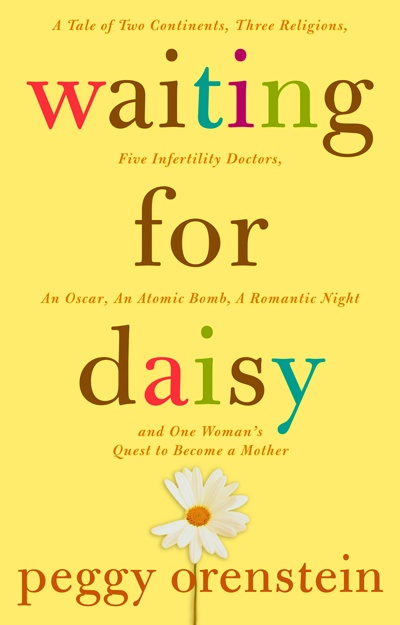
So I jumped on the bandwagon and read a couple of IF memoirs to see if I could relate. Since my local library branch only had two, and I wasn’t in the mood to wait for Interlibrary Loan, two was all I got. I will only review them briefly so as not to bore you.
In Peggy Orenstein’s Waiting For Daisy, I felt the requisite empathy towards the author. Her accounts of her journey through infertility and pregnancy loss were heart breaking and thought provoking. Thought provoking as in it made me think about myself in comparison, and what it must have been like for her to go through so much, both positive and negative. Her book was also entertaining since she traveled internationally and wove some lovely imagery that added a lot of color to the infertility palette. It was a bit like Elizabeth Gilbert’s Eat, Pray, Love, but with A.R.T. and a different kind of loss. And of course, a happy ending.
Then I sunk my teeth into Paulette Bates Alden’s Crossing the Moon, which I was looking forward to since the author had decided to resolve her infertility with living Childfree. I suppose I was looking for something in her book. Answers perhaps? Resolution? Absolution? Or maybe just validation. I figured I was at least in store for a good read.
And some of it was. A good read that is.
I did have some affection toward this book, mostly because she lived in my city, in my neighborhood and we even had the same RE. But quite frankly, that is where my fondness ended. To be honest, I found her so called memoir of infertility to be insipid and dull. It was 295 pages long, and about 25 pages of that was about the infertility logistics and her thoughts on them. The rest was a tedious diatribe on why she was so ambivalent towards motherhood. Her ambivalence was apparently a result of her blooming feminism in the 70’s, and the seemingly crippling fear she had of her own mother’s strength. Then as she was turning forty, she panicked about the fact that she never had(or wanted) children and jumped into the foray of Trying To Conceive and fertility treatment. All the while questioning if she really wanted to be a mother anyway.
While I don’t discount the pain she must have went through, I do think that this book does a discredit to the infertile community. There are very few books on infertility and childlessness written from the IF/childless point of view. And as far as I can tell, this was one of the first. And the impression it gives, is that all infertile women are feminist career women who forgot to have children until it was too late. Ironically the author brings this up, and writes of her distaste of being reduced to a cultural stereotype, but at the same time, her entire book strongly reinforces this association.
I am done with my stint in infertility literature and moved on to Barbara Kingsolver’s Animal, Vegetable, Miracle, ( I read all of her books) and Michael Pollan’s The Omnivore’s Dilemma. Cause food is always a good read and we all like to eat.

